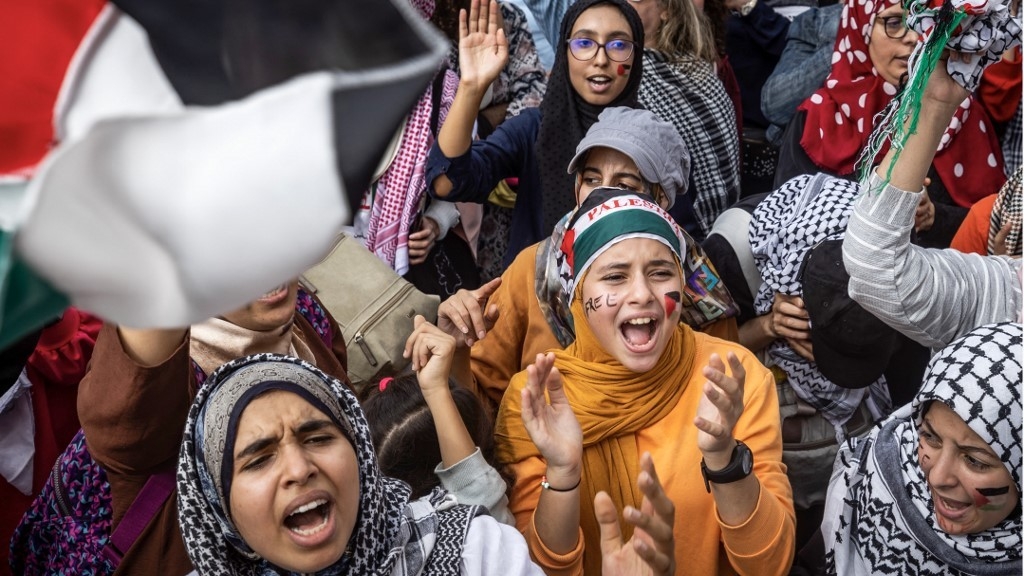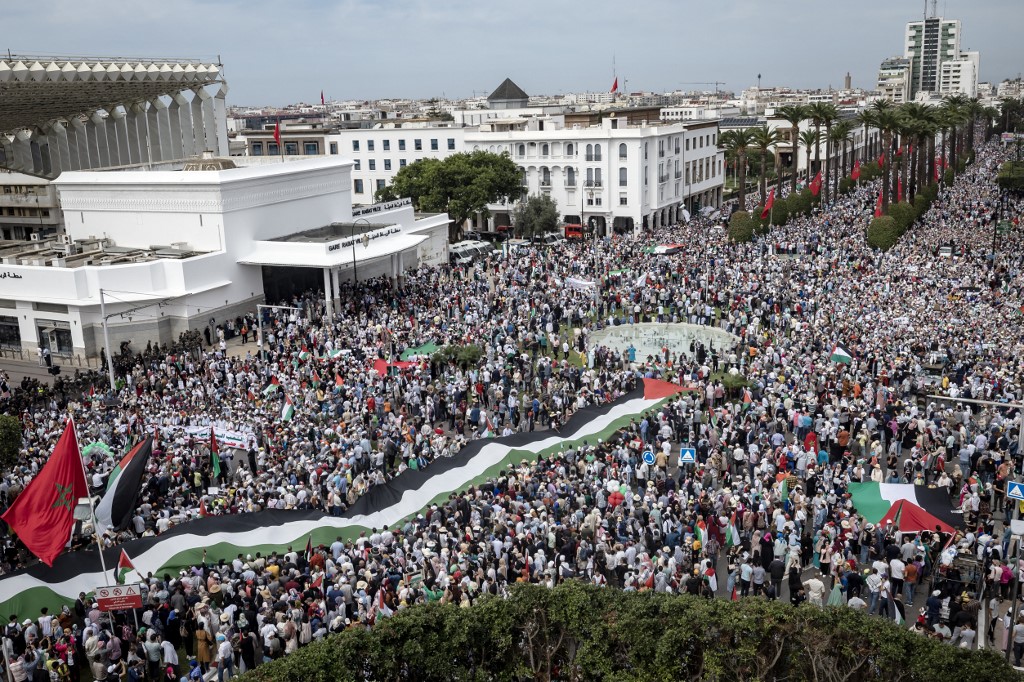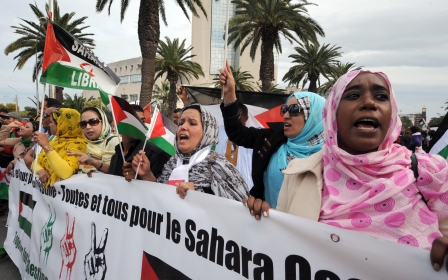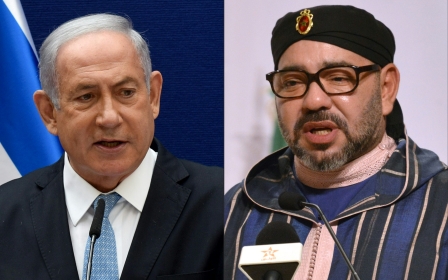Israel-Palestine war: Thousands in Morocco protest against Gaza bombardment

"It's impressive; it reminds me of the protests from the 2000s to denounce the invasion of Iraq," said Abdellah, wearing a keffiyeh around his neck, as he took part in a protest in Rabat on Sunday against the Israeli strikes on Gaza civilians.
Abdellah came from Casablanca to take part in the massive march in solidarity with Palestinian civilians targeted by Israeli strikes since 7 October, in the aftermath of the deadly surprise attack by Hamas on southern Israel.
The Rabat protest was organised by left-wing and Islamist political coalitions. The protesters were estimated to be in the tens of thousands, according to AFP. They chanted slogans calling for "the liberation of Palestine" and condemning the "genocide in Gaza".
Morocco had not seen such a significant pro-Palestinian gathering, even after the normalisation between Rabat and Tel Aviv in December 2020, as part of the tripartite deal between Morocco, Israel, and the United States.
Through this agreement, the kingdom received American recognition of its sovereignty over Western Sahara in exchange for the full restoration of diplomatic relations with Israel.
New MEE newsletter: Jerusalem Dispatch
Sign up to get the latest insights and analysis on Israel-Palestine, alongside Turkey Unpacked and other MEE newsletters
Since then, public demonstrations by activists from various associations supporting the Palestinian cause have become extremely rare.
Follow our live blog for all the latest on the Israel-Palestine war
For this gathering, "there were no particular issues with the authorities," explains Sion Assidon, a 75-year-old prominent figure in anti-Zionist activism in Morocco and a founding member of the Boycott, Divestment, Sanctions (BDS) movement in Morocco.
Assidon said the protesters wanted to "send a congratulatory message to Palestinian resistance because they successfully crossed the border for the first time in 50 years" and continued the fight for several days, taking prisoners, including a high-ranking member of the Israeli army, for subsequent exchange with Palestinian prisoners in Israel.
The Hamas attack launched on 7 October resulted in the death of 1,400 people, including civilians and combatants, and wounded 3,400 in Israel, while many hostages are still held in Gaza.
Subsequent Israeli bombings on Gaza have so far killed at least 2,800 Palestinians, over half of them children and women. At least 1,000 people are still missing under the rubble, and more than 9,600 have been wounded, according to the health ministry.
On Wednesday, 11 October, Moroccan Foreign Minister Nasser Bourita presided over an emergency meeting of the Arab League in Cairo, jointly convened by the Palestinian state and the Kingdom of Morocco.
'We don't need to wait for a statement from the Ministry of Foreign Affairs to take to the streets and express our rejection of the genocidal policies of the Israeli regime'
- Ikrame, biology student
The meeting aimed to discuss political actions to be taken at the Arab and international levels to end the escalation in Palestinian territories.
During his address, the top diplomat stated that "the targeting and attacks against civilians, regardless of their origin, raise great concern and compel us to emphasise the necessity of providing them with full protection under international humanitarian law, so that they do not become targets or victims of the conflict."
Ikrame, a biology student in Rabat, who participated in Sunday’s protest, said the opinion of the people should be distinguished from that of the government.
"We don't need to wait for a statement from the Ministry of Foreign Affairs to take to the streets and express our rejection of the genocidal policies of the Israeli regime,” she told MEE’s French website.
“What Morocco does through its diplomacy is one thing, what the people truly think is another."
'Shameful'
For many Moroccans, including Assidon, the official response from Moroccan diplomacy falls far short of their expectations.
"It's shameful; it's pathetic. Through the media, I've addressed the highest authorities of the country. There is a minimum [to be done] to protest against the killings in Gaza, even in diplomacy, such as recalling the Moroccan representative [in Israel] and expelling the head of the Israeli liaison office in Rabat," he said.
"We want the office to be closed and an end to normalisation. This isn't the sentiment of just 50 people in a sit-in; it's a call echoed by the entire crowd. It's a much deeper popular wave."
Assidon, however, feels that the demonstration could have been even larger. "Some political parties that used to support us have abandoned ship and accepted normalisation," he laments.
While the Islamists of the Justice and Development Party (PJD) praised a "heroic operation carried out by the Palestinian resistance" and denounced "the ongoing real terrorism practised by the Zionist and racist occupation in plain sight of the world with the support of major powers," the National Rally of Independents (RNI), a liberal party in power since 2021, merely emphasised "Morocco's efforts, led by King Mohammed VI in his capacity as the head of the Al-Quds Committee [for monitoring the situation in Jerusalem], to find a just, comprehensive, and lasting solution to the Palestinian issue."
The party of the prime minister, Aziz Akhannouch, didn't miss the chance to take a jab at the PJD, urging them to "align with the official position of the Kingdom of Morocco, which calls on both parties to avoid violence, as it will only escalate tensions and cause more casualties."
But Housni, a young lawyer from Tetouan, disagreed, saying: "The tens of thousands of people who took to the streets on Sunday think differently. While political parties are expected to align with the king's policy, it's not necessarily the case for citizens."
However, expressing disagreement with normalisation can lead to imprisonment. In July, Said Boukioud, a 48-year-old Moroccan residing in Qatar, was arrested upon his return to Morocco and then sentenced a few days later to five years in prison and a fine of 40,000 dirhams (approximately $3,900) for "undermining the monarchical regime".
The judiciary accused him of criticising the restoration of diplomatic relations between Morocco and Israel on Facebook in December 2020.
*This article was originally published in French.
Middle East Eye delivers independent and unrivalled coverage and analysis of the Middle East, North Africa and beyond. To learn more about republishing this content and the associated fees, please fill out this form. More about MEE can be found here.






